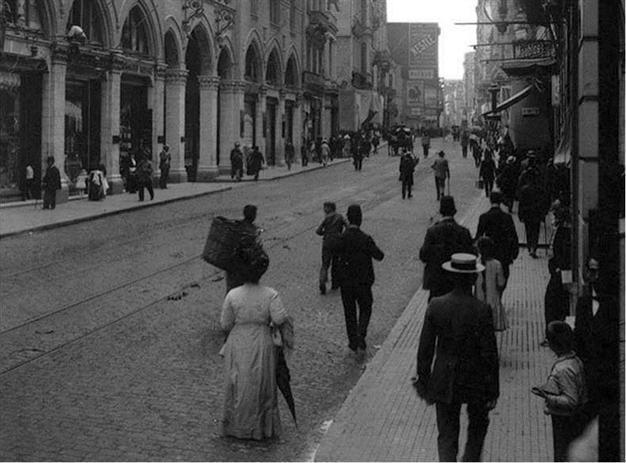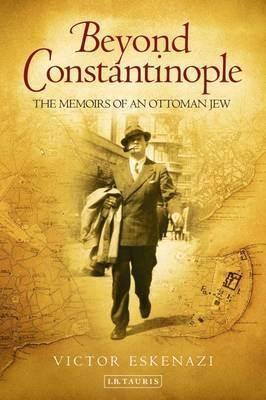Memoirs of an Ottoman Jew
William Armstrong - william.armstrong@hdn.com.tr

Pedestrians walk on Istanbul’s central İstiklal Avenue in the 19th century.
‘Beyond Constantinople: The Memoirs of an Ottoman Jew’ by Victor Eskenazi (IB Tauris, $35, 208 pages)Victor Eskenazi was born in 1906 in Istanbul, into an extended Sephardi Jewish family of 50 members in the Beylerbeyi neighborhood. The large waterside mansion (yalı) where he grew up has since burned down – an eloquent metaphor because the world he describes has also since vanished.

In the introduction to this memoir, his son calls Eskenazi a kind of “Ottoman seigneur,” representative of the religious and ethnic minorities that thrived in the Ottoman urban milieu. By the time he came of age that world was slipping away. Although it did so, the urbane Eskenazi lived a rich life full of travel, witnessing history. He made trips back to his ancestral home, though the city he knew as a boy no longer existed.
The book is charming precisely because he avoids a heavy political focus. Politics is only a background for fascinating social details of a city “inhabited by people of very varied origin … a babel of tongues walking through its streets.” We can sometimes glimpse lingering traces of Eskenazi’s world in the chaotic present-day Istanbul: He describes familiar baskets lowered from windows on string to buy goods, and the raucous calls of wandering street vendors “plodding along, bent under the weight of a large pannier laden to the brim with melons and watermelon. All kinds of hawkers offering an endless variety of merchandise, each with his own traditional and distinctive cry.”
Eskenazi had a classic Istanbul upbringing. His family had lived in the Ottoman capital for centuries but enjoyed British nationality because of earlier ties to Gibraltar. “Although I was born in Constantinople from parents who had also been born there I considered myself a foreigner,” he writes. His family’s Jewishness was less a set of religious precepts, more a moral center and code of ethics. Sephardi Jews continued to maintain the customs they brought with them after exile from Spain in the 15th century. “They had also conserved a grain of haughty pride of pure Spanish stamp. They had enjoyed the privilege of never having to bow their head to anyone, having preferred exile to slavery,” Eskenazi writes.
The community he describes was semi-detached from wider society - but was still somehow an essential part of it. “A Sephardi Jew had many friends outside his community and difference in faith and nationality was of no importance in everyday life,” Eskenazi writes, “but he would never marry out of his religious group and there was a sort of invisible barrier that materialized on some issues at times”:
Although we were born and had always lived in Turkey, we belonged to a separate group of people that, although settled in Turkey for five centuries, had not absorbed the physiognomy of the nation that gave it hospitality. The Sephardi Jewish community, although completely free in its adopted country, lived in a kind of voluntary invisible enclosure. Constantly and closely in contact with the population at large, it formed a separate ethnic entity which kept to strict rules of custom and behavior.
This state of things was not enforced by the local authorities. It was simply “a status quo that came in very handy to both sides.” Life revolved around the capital and its suburbs, and the Eskenazis considered Anatolian cities “very much like pioneers on the fringes of civilization.”
But such relaxed national loyalty could not last forever – particularly after the British occupied Istanbul for five years after the First World War. The Ottoman Empire was defeated and ultimately crumbled. The new Turkish Republic promoted a far more rigid sense of national identity than the empire had in its multiconfessional heyday. Jews found a place – however restricted - in the new republic, but Victor Eskenazi did not stick around long to find out.
He went on to live a peripatetic life based in Vienna, Milan and Britain. Much of the book recounts his experiences as a British intelligence officer posted in Cairo, Cape Town, London and elsewhere during the Second World War. After the war he built a career as an antiques dealer, but he skips over these decades in just a few pages. Also strangely, he barely mentions his wife of 52 years Laure, to whom he was by all accounts devoted.
Eskenazi was apparently a private and reserved man, but this vivid memoir describes a colorful, rewarding life. His writing is sometimes a little awkward and lacking a truly distinctive voice. But the era and milieu he depicts are inherently evocative. The book goes down very well accompanied by
the music of Victor’s namesake Roza, the Jewish-Greek singer of rebetiko and fellow Istanbul native. Both are infused with the sepia-tinged melancholy of a lost cosmopolitanism. When talking about bygone Istanbul that cosmopolitanism is often sentimentalized, but it really was a splendid thing.
*Follow the Turkey Book Talk podcast via iTunes here, Stitcher here, Podbean here, or Facebook here.

 In the introduction to this memoir, his son calls Eskenazi a kind of “Ottoman seigneur,” representative of the religious and ethnic minorities that thrived in the Ottoman urban milieu. By the time he came of age that world was slipping away. Although it did so, the urbane Eskenazi lived a rich life full of travel, witnessing history. He made trips back to his ancestral home, though the city he knew as a boy no longer existed.
In the introduction to this memoir, his son calls Eskenazi a kind of “Ottoman seigneur,” representative of the religious and ethnic minorities that thrived in the Ottoman urban milieu. By the time he came of age that world was slipping away. Although it did so, the urbane Eskenazi lived a rich life full of travel, witnessing history. He made trips back to his ancestral home, though the city he knew as a boy no longer existed.